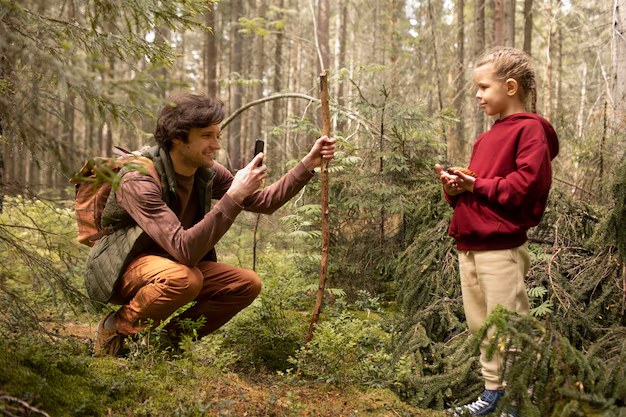Adventures The wilderness has always held a fascination for those who seek the ultimate challenge. It is a place where man and nature intersect in raw, unfiltered ways, testing both physical endurance and mental resilience. Some of the most profound and life-changing stories come from the edge of the earth, where survival becomes not just a necessity but an adventure in itself. These stories reveal more than just the power of nature—they uncover the strength of the human spirit and the wisdom that arises from overcoming unimaginable challenges.
In this article, we’ll dive into some of the most incredible survival stories from the wilderness and explore the life lessons that can be drawn from them. From the frozen tundras of the Arctic to the dense, unpredictable jungles of the Amazon, these stories of adventure and survival demonstrate the extraordinary courage, resourcefulness, and determination of those who dare to face the unknown.
Key Takeaways:
- Resilience is the key to surviving even the most harrowing situations.
- Preparation and respect for nature are crucial when exploring the wild.
- Leadership and resourcefulness can make a difference in extreme conditions.
- Survival is not just about physical strength, but also mental toughness and adaptability.
- The wilderness is a powerful reminder of our vulnerability, but also our capacity for courage and determination.
Shackleton’s Epic Journey: Leadership and Perseverance
- Story: In 1914, Ernest Shackleton and his crew set out to cross Antarctica but were stranded when their ship, the Endurance, became trapped in ice. After enduring harsh conditions for over a year, they survived through Shackleton’s leadership.
- Life Lesson: The importance of perseverance, teamwork, and adaptability. Shackleton’s ability to keep hope alive and focus on the survival of his crew under extreme duress teaches us that leadership in the face of adversity is essential.
Basic Survival Skills: Lessons for Life

- Survival in the wilderness involves basic skills: finding food and water, building shelter, and maintaining strength in body and mind. These fundamental survival skills align with key lessons in life that help us thrive even in the face of challenges.
Key Lessons:
- Resilience and Adaptability:
- Story: Survivors often have to adjust to changing conditions, like weather shifts, injuries, or scarcity of resources.
- Life Lesson: Adaptability is critical in life. Whether faced with job changes, personal setbacks, or sudden challenges, the ability to remain calm, adapt, and find solutions is a crucial skill.
- Self-Reliance and Resourcefulness:
- Story: Wilderness survivors often rely on their creativity to craft tools, find food, and build shelter. These skills are developed through trial, error, and ingenuity.
- Life Lesson: Resourcefulness and the ability to rely on oneself are key to overcoming obstacles. When we face difficulties, finding creative solutions and using available resources can help us succeed.
- Mental and Physical Endurance:
- Story: Many survival stories involve a battle not just with nature but with the survivor’s own body and mind. Mental fortitude often proves just as important as physical strength.
- Life Lesson: Mental resilience is as important as physical endurance. Building mental strength and practicing mindfulness helps us manage stress and anxiety in everyday life.
The Wild’s Deep Connection: Respect for Nature
- In the wilderness, survival often hinges on a deep understanding of nature—respecting the environment and learning from it. Many survival stories highlight how the natural world provides everything necessary for survival if approached with respect and awareness.
Key Lessons:
- Understanding the Natural World:
- Story: Explorers like John Muir and naturalists have demonstrated the importance of connecting with nature to thrive. Their respect for ecosystems, animals, and landscapes allowed them to survive and learn from the wilderness.
- Life Lesson: Sustainability and environmental awareness. In today’s world, understanding and respecting the environment is crucial for our own survival. This lesson speaks to the importance of sustainable practices in all aspects of life.
The Power of the Unknown: Personal Growth Through Challenges

- The wilderness is an unpredictable and often dangerous place, but it’s also a place of profound personal growth. The unknown challenges adventurers face push them beyond their limits, encouraging self-discovery and growth.
Key Lessons:
- Facing the Unknown:
- Story: Stories of explorers like Thor Heyerdahl or modern-day survivalists show how venturing into the unknown forces growth. They faced perilous journeys and were often uncertain of their success.
- Life Lesson: Embrace uncertainty and push boundaries. Just like wilderness explorers, we often grow the most when we step outside our comfort zones and face life’s challenges head-on.
The Importance of Patience: Survival Isn’t Instant
- In many survival stories, time is one of the biggest factors. Whether it’s waiting for rescue, waiting for a change in weather, or waiting for a critical moment to act, survival often involves the virtue of patience.
Key Lessons:
- Delayed Gratification and Persistence:
- Story: The famous survival story of Alexander Supertramp (Chris McCandless), who ventured into the wilds of Alaska, demonstrates how impatience and a lack of preparation can lead to disaster. McCandless’s ultimate demise was largely due to his failure to plan ahead and understand the wild’s unpredictable nature.
- Life Lesson: The importance of planning ahead and practicing patience in the face of uncertainty. Not every challenge has an immediate solution, and sometimes, the best course of action is to wait for the right moment to act. This also teaches us about delayed gratification—success often comes to those who are willing to wait, plan, and persevere.
Embracing Solitude: The Power of Silence and Reflection
- Many survival stories involve significant time spent in solitude, which can be a catalyst for deep reflection. This isolation often forces individuals to examine themselves in a way that everyday life rarely does. While loneliness can be difficult, it can also be a transformative experience.
Key Lessons:
- Self-Discovery and Reflection:
- Story: The story of Christopher Columbus and his voyages into the unknown led him to spend months alone at sea, reflecting on his purpose and aspirations. In the wild, adventurers often experience the same sense of introspection, where the isolation forces them to consider their values and place in the world.
- Life Lesson: Solitude provides an opportunity for self-discovery. In our busy, noisy world, we often fail to listen to our inner thoughts. Spending time in quiet solitude allows for personal growth, deep reflection, and a better understanding of our true selves.
Resourcefulness: Using What’s Around You

- Many survivalists in the wilderness must rely on resourcefulness to make use of their surroundings. What seems like an obstacle at first—an abandoned cabin, a wild animal, or a simple tree branch—often turns out to be a valuable resource when seen through a survivalist’s eyes.
Key Lessons:
- Turning Limitations Into Opportunities:
- Story: The tale of Les Stroud (aka Survivorman), who is known for his solitary wilderness survival shows, highlights the need to adapt to the environment and find creative solutions. Whether it’s using a piece of bark to build a shelter or crafting tools from rocks, Stroud shows how survival often depends on making the most of what’s available.
- Life Lesson: In life, we often face limitations—financial, emotional, or physical—that seem insurmountable. However, resourcefulness teaches us to make the most of what we have and to view challenges not as obstacles but as opportunities to innovate and create solutions.
Teamwork in Survival: Collaboration Over Isolation
- While many survival stories emphasize individual resilience, they also highlight the importance of teamwork in overcoming adversity. In extreme conditions, humans have learned to rely on one another for emotional support, physical help, and decision-making.
Key Lessons:
- Strength in Unity:
- Story: The story of the chilean rugby team’s crash in the Andes (featured in the book Alive) is a remarkable tale of survival that revolves around the team’s ability to collaborate and support each other. They faced immense odds, yet their collective effort allowed them to survive the harsh conditions and find a way out.
- Life Lesson: While self-reliance is important, human connection and teamwork often lead to greater success. In life, collaboration and supporting others can often lead to better outcomes than working alone. Whether in the workplace or in personal relationships, our ability to lean on others and offer support is crucial.
Mind Over Matter: The Power of Mental Strength
- Survival stories often emphasize that it’s not just about physical endurance but mental toughness. In the wilderness, it’s the ability to stay positive, keep moving forward, and hold onto hope that often separates those who survive from those who give up.
Key Lessons:
- Mental Fortitude and Positivity:
- Story: Aron Ralston, who was trapped by a boulder in a remote canyon and ultimately had to amputate his own arm to escape, is a powerful example of mental strength. His sheer willpower and determination to survive, even when faced with overwhelming odds, allowed him to overcome a seemingly impossible situation.
- Life Lesson: The human mind is incredibly powerful. Optimism, hope, and mental determination can help us endure life’s hardest challenges. Developing mental fortitude is key not just to survival in the wild, but to thriving in a world filled with uncertainties.
The Beauty of the Journey: Beyond the Destination
- In many survival stories, the journey itself—rather than just the outcome—is what leaves the most lasting impact. Whether it’s the landscapes explored, the creatures encountered, or the insights gained, these journeys are transformative.
Key Lessons:
- Enjoying the Process:
- Story: The adventure of John Muir, who traveled across the Sierra Nevada and Yosemite, immersed himself in nature, writing extensively about its beauty and life lessons. While Muir did face difficulties, it was the experiences along the way that shaped him as an environmentalist and writer.
- Life Lesson: Life is often more about the journey than the destination. Finding joy in the process of growth, exploration, and learning is just as important as the final achievement. Gratitude, awareness, and acceptance of the present moment help us savor the journey, no matter how difficult.
Also Read : From City Streets To Desert Highways: The Ultimate Road Trip Experience
Conclusion
The stories of survival in the wilderness are not just about enduring harsh conditions; they are about learning life lessons that help us navigate our own personal journeys. Whether it’s through Shackleton’s leadership, the importance of resilience and adaptability, or the connection to nature, these experiences remind us of the strength we carry within ourselves.
FAQS
1 What are the key life lessons learned from survival stories in the wilderness?
- Resilience and Adaptability: Overcoming adversity by staying flexible and persevering.
- Self-Reliance and Resourcefulness: Using creativity and available resources to solve problems.
- Mental and Physical Endurance: Building both physical strength and mental fortitude to face challenges.
2. What is the most famous survival story in the wilderness?
One of the most famous survival stories is that of Ernest Shackleton and the Endurance expedition in 1914. Shackleton’s leadership and the crew’s determination allowed them to survive for over a year in Antarctica after their ship was trapped in ice, offering lessons in leadership, teamwork, and resilience.
3. What skills are essential for survival in the wilderness?
- Finding food and water: Understanding how to identify edible plants, hunt, and collect water.
- Building shelter: Using materials from the environment to create protection from the elements.
- Navigation: Knowing how to find your way without modern tools.
4. How do survival stories teach us about personal growth?
Survival stories highlight how facing extreme challenges pushes individuals to grow, whether by developing emotional resilience, learning to rely on themselves, or discovering deeper inner strength. They show us how personal growth often happens when we step out of our comfort zones and confront the unknown.
5. How does nature play a role in survival?
Nature provides both challenges and solutions. In wilderness survival, knowing how to read natural signs, use natural resources (wood, water, etc.), and respect the environment is crucial. Surviving in nature is a balance of understanding its dangers and its ability to provide everything needed for survival if approached with respect and knowledge.
6. What are the dangers of the wilderness that people should be aware of?
- Severe weather conditions (extreme cold, heat, storms).
- Wild animals (dangerous predators, insects carrying diseases).
7. Can anyone become a wilderness survival expert?
Yes, anyone can become skilled in wilderness survival through proper training, practice, and experience. Basic survival courses teach essential skills, and spending time in the wild builds practical knowledge. However, it requires mental toughness, patience, and a deep respect for nature to truly thrive in extreme environments.
